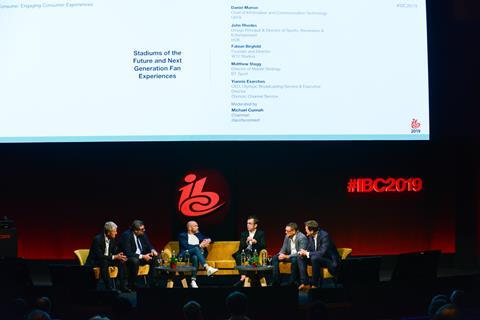- Stadiums have been “underserved” but 5G could change that
- VR and 5G discussed during IBC “Stadiums of the Future” panel
- Better stadium connectivity will benefit broadcasters and punters

5G will be a gamechanger opening up a new era of in stadium sports coverage.
That was the verdict of a panel of senior sports executives speaking in a conference session Stadiums of the Future and Next Gen Fan Experiences.
Olympic Broadcasting Service & executive director Olympic channel services CEO Yiannis Exarchos said: “We all see that 5G will be a big enabler in terms of providing new digital experiences such as AR and VR.
“For me it is fundamental how the in-venue experience can be improved and for the first-time technology can now provide a very good experience. This ‘in-venue’ experience can become unique and exciting. We can use the next generation of technology to expand the capabilities of [sports] storytelling.”
Exarchos cautioned that it was possible to get carried away by all the tech jargon in sport. The most important thing was to ensure good connectivity in stadia so that people can do their basic desire to ‘post, receive and share’, he said.
BT Sport director of mobile strategy Matthew Stagg admitted: “To date we have underserved fans in the stadium. We need to look at the latest technology, particularly 5G, to enhance their experience.”
Stagg added that there was also an opportunity to provide new sports services for fans who couldn’t get tickets for events. “The question is how do we take that stadium experience into the home – we need to find that sweet spot where in stadium fans and the fan at home who can’t get a ticket are both happy.”
Low latency
One innovation suggested by the low latency, speed and bandwidth of 5G could be offering armchair sports fans a virtual reality ringside seat at sports events that they have been unable to secure tickets for.
Stagg said 5G would enable new ways to cover sports, with producers benefitting from untethered cameras allowing producers to tell the story of the event with more freedom.
“We have the ability to do that with one technology – 5G – to provide these great experiences for the customer.”
Better connectivity would also present sports rights holders with new creative challenges, said Yiannis Exarchos. “How do we create services which are more personalized, yet don’t destroy the sense that the fan is actively participating in a bigger event.”
Some stadium owners have expressed concern that better in stadia connectivity will see fans spending more time using personalized digital devices and less time engaging with the atmosphere in the stadium.
UEFA chief of information and communication technology Daniel Marion said that the US had shown the way in building sports stadia which offer a much wider range of services compared to their European equivalents.
“We need people to go to the venues and be excited. That’s that good for television. Venues need to be able to offer ubiquitous connectivity, but there are still stadiums [in Europe] which don’t have effective Wi-Fi,’ he said.
Fabian Birgfeld founder and director of interactive design studio W12 Studios said: “The key now was to develop the right business models that would benefit stadium owners, right holders and broadcasters, he said.
“The stadium technology is no longer the barrier. It’s not the key challenge. The challenge is what new business models and investment partnership we can find a way to bring in the significant investment needed.”
























No comments yet